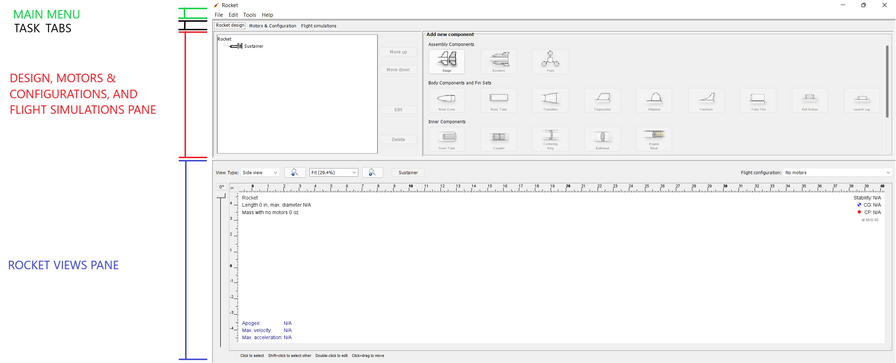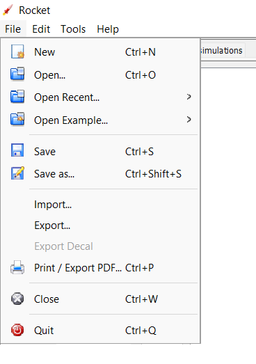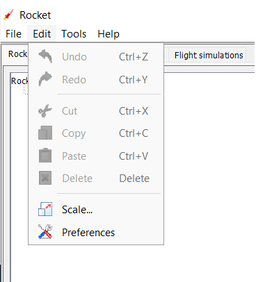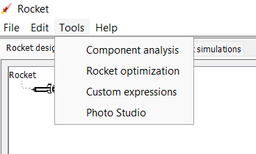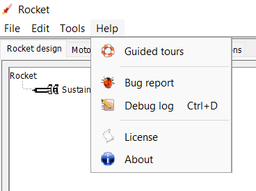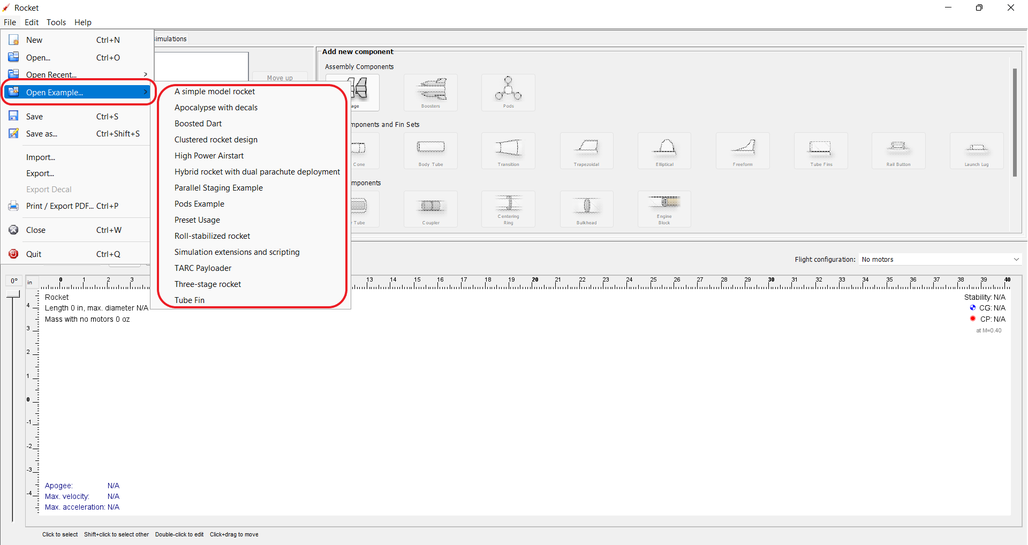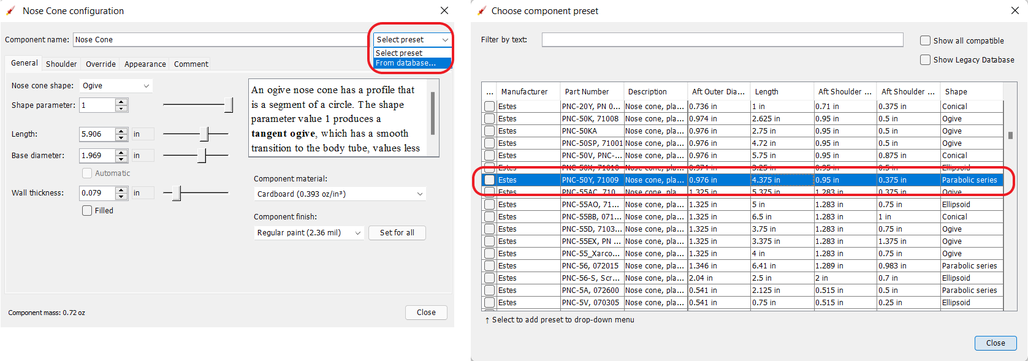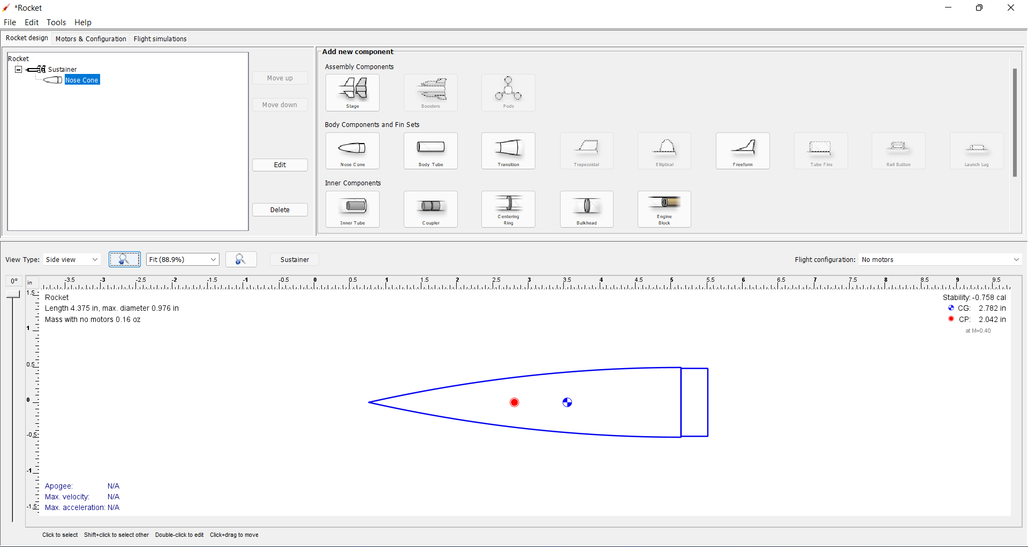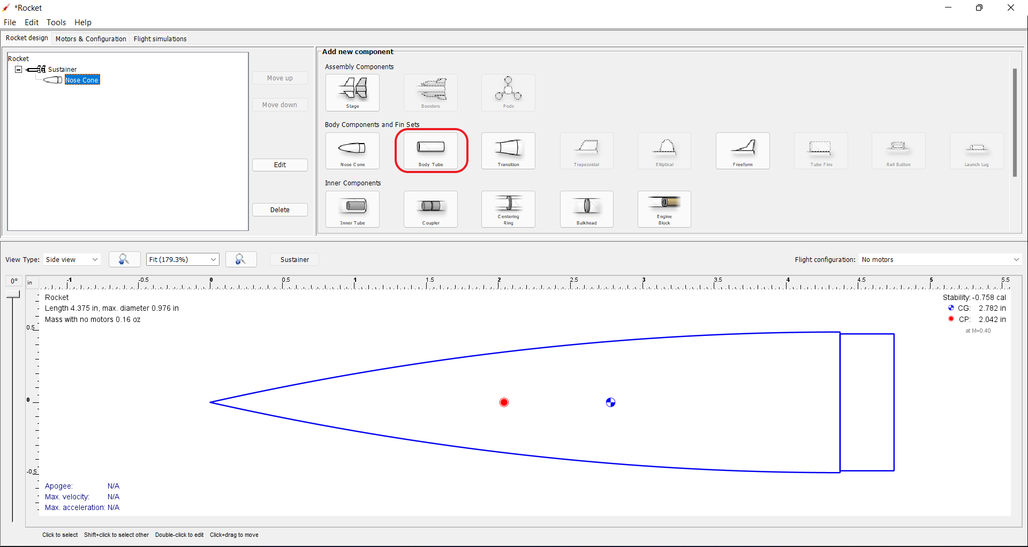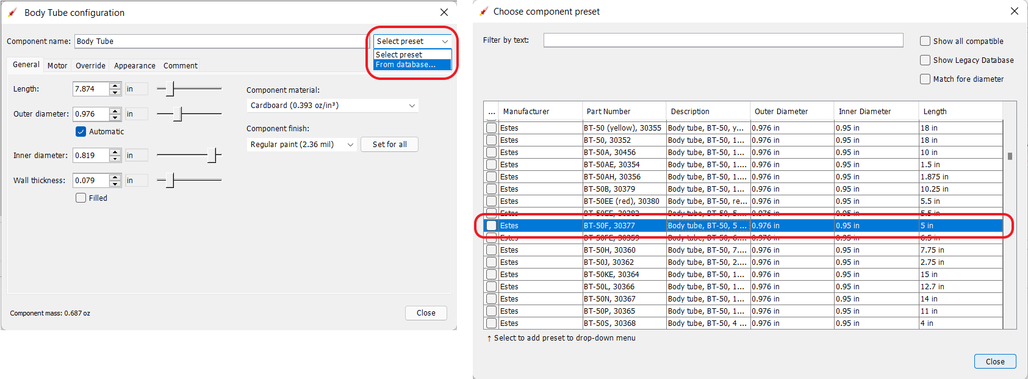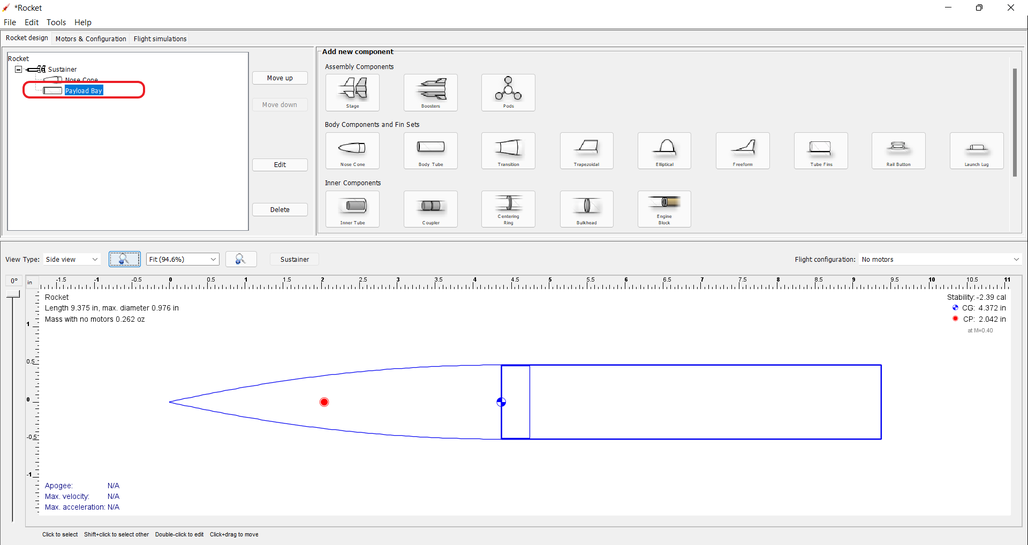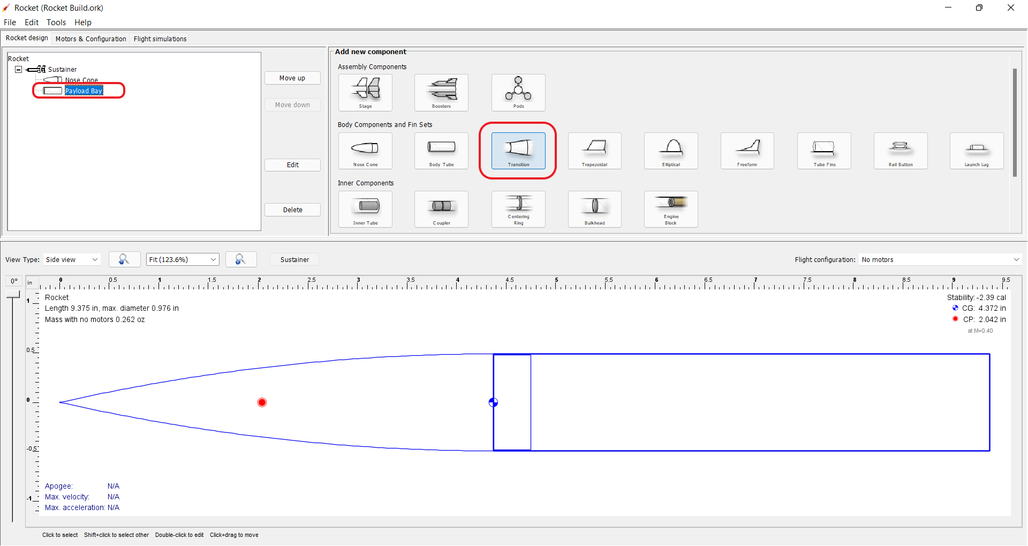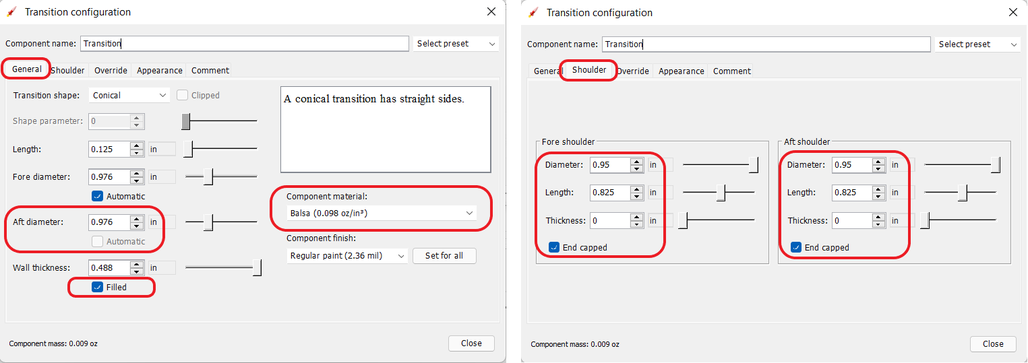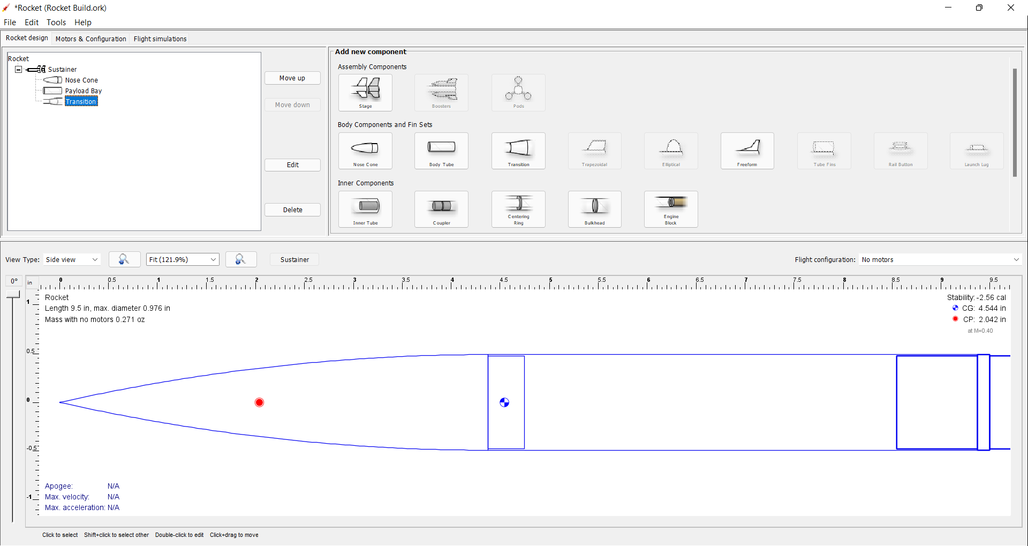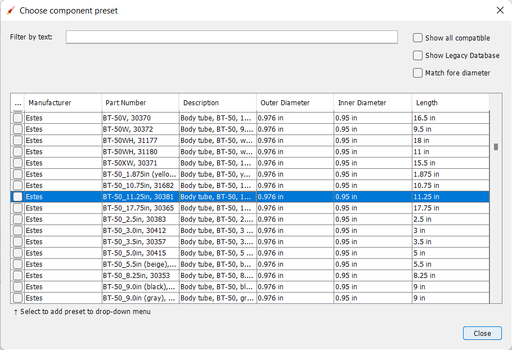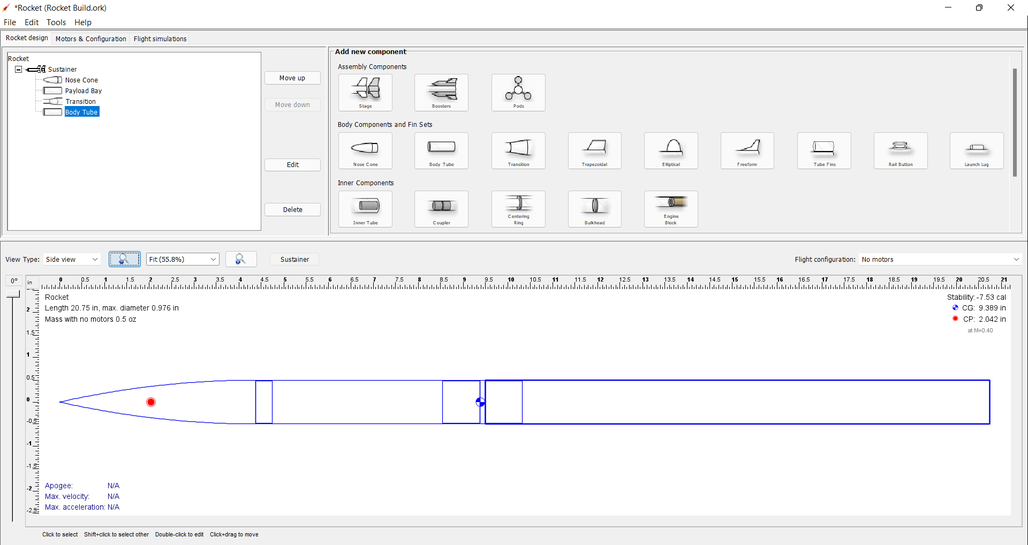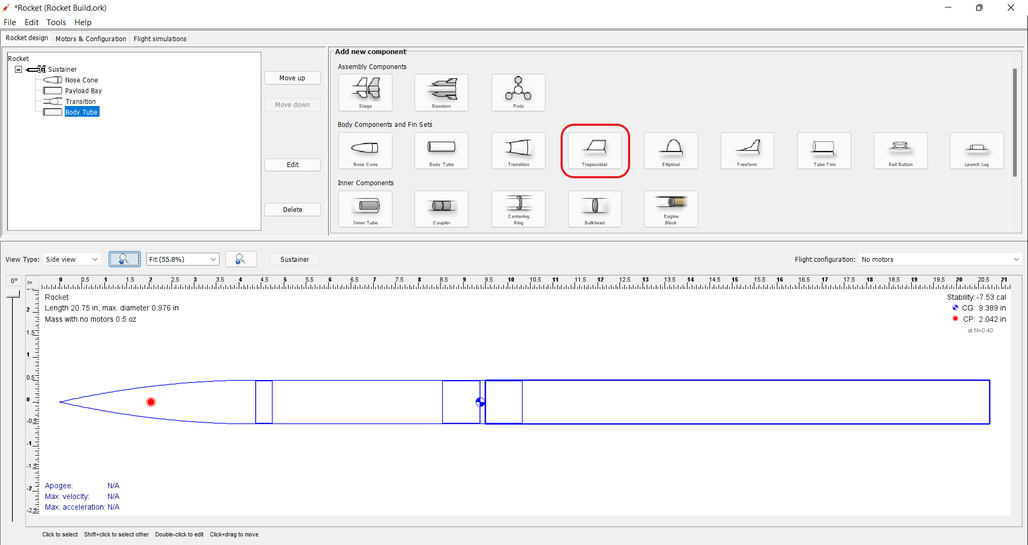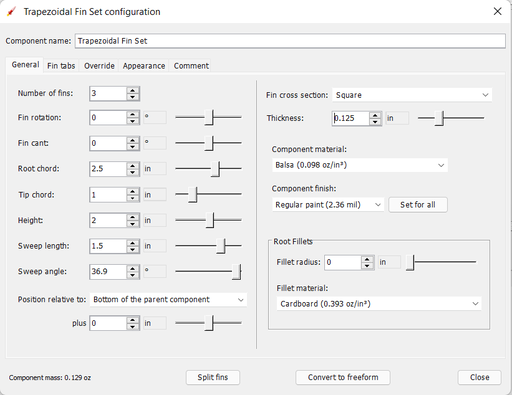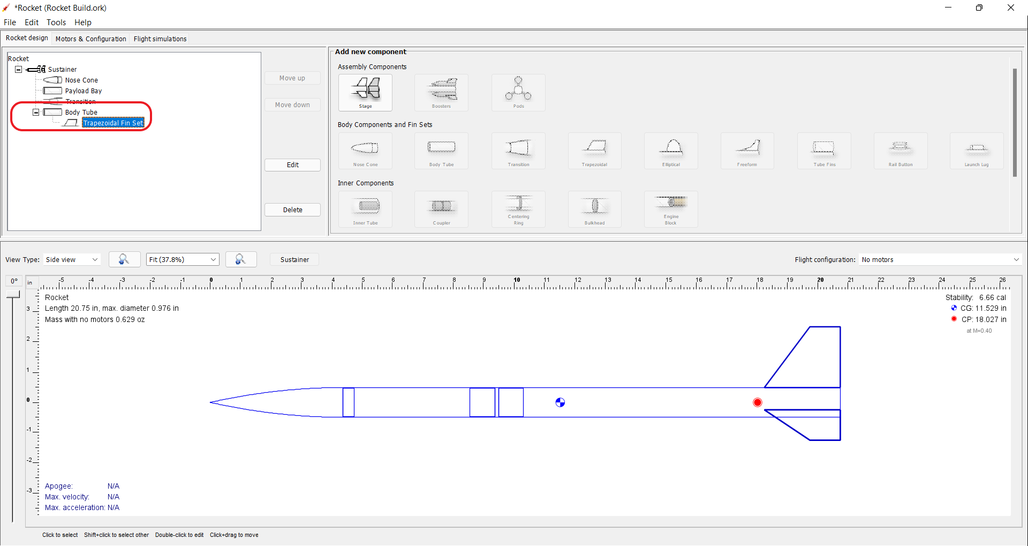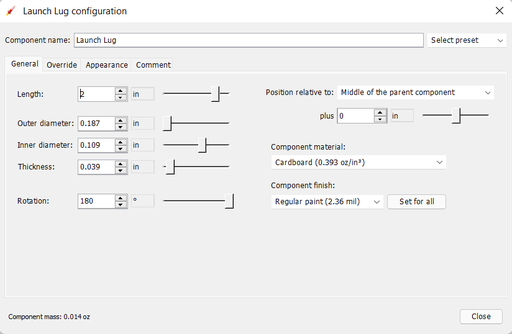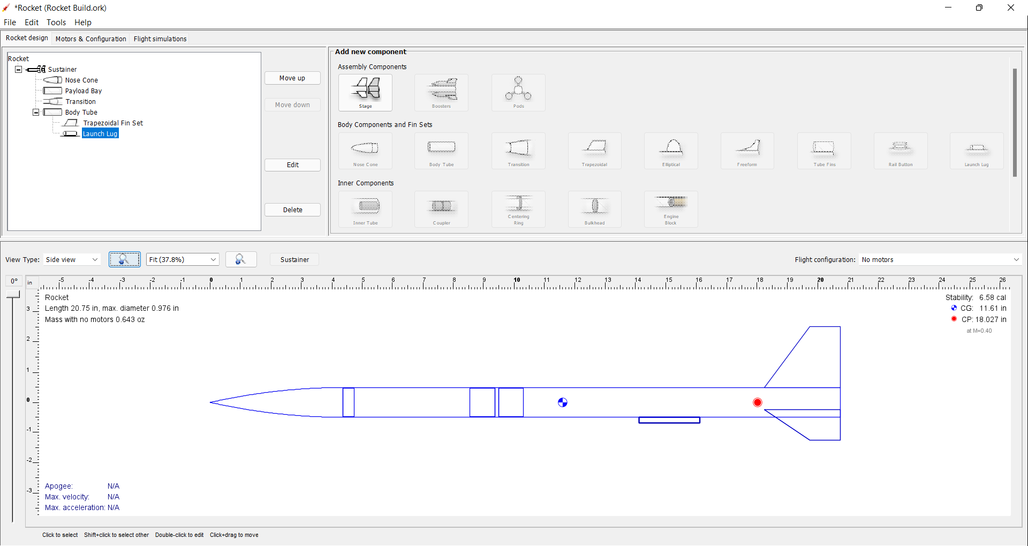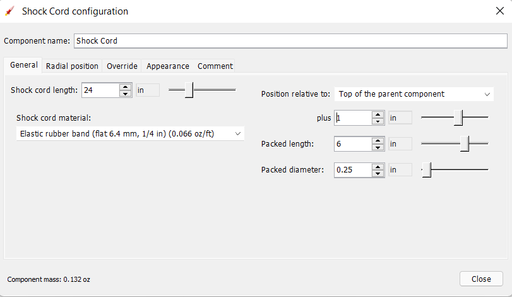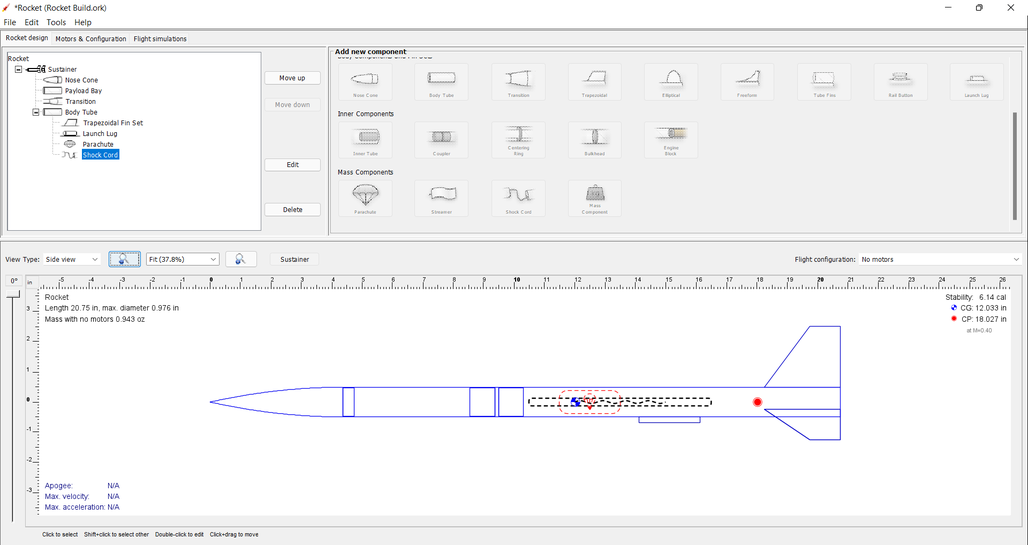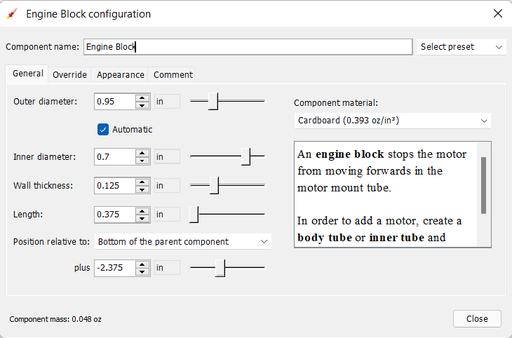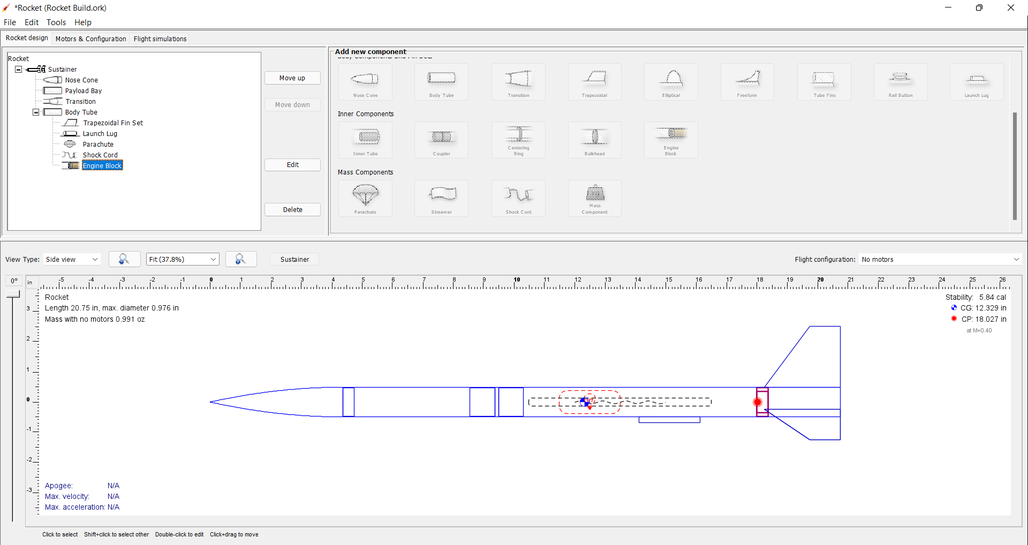Difference between revisions of "Getting Started"
| Line 388: | Line 388: | ||
= Viewing Your Design = | = Viewing Your Design = | ||
| + | |||
| + | == Basic Views == | ||
<br />With the airframe complete, you can view your design in either 2D (as above) or three 3D views. The most commonly used of which are ''3D Unfinished'' and ''3D Finished''<br />. | <br />With the airframe complete, you can view your design in either 2D (as above) or three 3D views. The most commonly used of which are ''3D Unfinished'' and ''3D Finished''<br />. | ||
Revision as of 11:37, 3 April 2022
|
The current User's Guide is very much a work in progress, any help would be greatly appreciated! |
In this section we have a look at how OpenRocket is organized, by analyzing in detail the structure of the user interface. We will also briefly mention the Example projects that are accessible from the File menu. After reading this section you will have a thorough understanding of how OpenRocket is structured, and will be ready to start designing a rocket of your own. If you already know how this program is organized, feel free to jump to Basic Rocket Design, the next section.
The User interface
The OpenRocket user interface is divided horizontally into four sections, the Main Menu (green); the Task Tabs (black); the Rocket Design, Motors & Configuration, and Flight Simulation Pane (red), and the Rocket Views Pane (blue).
Main Menu
| Menu Item | Description | |
|---|---|---|
| File | The File Menu is divided into five divisions by function, (1) file opening options; (2) file saving options; (3) import and export options; and (4) closing and (5) quiting options.
|
|
| Edit | The Edit Menu is divided into three types of operations, (1) undoing and redoing an action; (2) cutting, copying, pasting, and deleting components and text; and scaling the rocket and system preference. | |
| Tools | The Tools Menu provides design tools which allow the user to analyze the effect of specific components, optimize particular rocket characteristics, create custom expressions for specialized to analysis, and a photo studio which displays the rocket in 3D with a variety of backgrounds and effects. | |
| Help | The Help Menu is divided into three sections, (1) guided tours demonstrating the use of OpenRocket; (2) bug reporting and debugging tools to assist users provide feedback to the developers; and (3) licensing and version and other general information about OpenRocket. |
Task Tabs
The windows shown below utilize the A simple model rocket example included with OpenRocket.
| Rocket Design | |
|---|---|
| The Rocket Design tab is divided into three sections, the component tree, component arrangement buttons, and component selection buttons. The components available in OpenRocket are divided into four classes based upon component function. These classes are assembly components, body components and fin sets (external components), internal components, and mass components (which include electronics and recovery components). Components are greyed out until it would be appropriate to add that component type. As components are added, you will see the component tree (on the left side of the window, grow with each component added. For a detailed description of each component, see Component Details. |
|
| Motors & Configuration | |
| The Motors & Configurations tab is where you select motors, recovery events, and stage timing. Motor configuration options include creating new configurations, renaming existing configurations, removing (deleting) configurations, and copying configurations. With a specific configuration selected, you may select (or select a different) motor, remove the motor, or select and reset the motor ignition timing. For more motors and configuration utilization details, see Motors & Configuration Details. |
|
| Flight Simulations | |
| The Flight Simulations tab is where you manage and flight simulations and flight simulation plots. From here, you can add new simulations, or edit, run, or delete existing simulations. Select a single simulation, and you can even plot and export the simulation results. For more details on ow to use these functions, see Flight Simulations Details. |
Rocket Views
The windows shown below utilize the A simple model rocket example included with OpenRocket.
| The Side View and Back View are line drawings, similar to a blueprint that shows all of the rocket components and the placement of those components. Almost all of your design work will take place in the side and back views. | |
| Side/Back View | |
The 3D Figure and 3D Unfinished view allow you to look through the rockets exterior to view many of the interior components. These views can help you more clearly see the relationship between the placement of different components inside the airframe. |
|
| 3D Figure/3D Unfinished | |
The 3D Finished view shows you what the rocket will look like when finished. OpenRocket allows you to select component colors, inside and outside of outer tubes, right side or left side of fins, and even creating transparent components, all with or without decals (transparent or opaque). |
|
| 3D Finished |
Become Familiar with OpenRocket
For new users of OpenRocket, before attempting to create your own custom rocket design, it is strongly recommended that you become familiar with the OpenRocket user interface and generally accepted rocket design principles by opening and looking at how an example is assembled, making changes to the example, and understanding how to simulate flights. The example designs are found here:
| File → Example... → |
|---|
Starting a New Design
Rocket Configuration
To build your first rocket, start OpenRocket, then double click the Rocket label at the top of the component tree to open the Rocket configuration pop-up window. OpenRocket allows you to name your design, identify the designer, make comments, and create a revision history.
The default design name is Rocket, but that name can be changed, and a design name change also changes the name of the rocket shown on the component tree. So, rename your design and enter the designer, comments, and revision history information you desire.
| Double-Click Rocket | |
|---|---|
| Rename Rocket |
← Go to Become Familiar with OpenRocket
Adding External Components
Now it's time to start putting together components to build the rocket design. The generally accepted way of putting together a rocket design is from top to bottom, from nose to tail. So, we'll add the nose cone first.
Selecting a Nose Cone
With the Stage selected, click on the Nose Cone button and the Nose Cone configuration window will pop up. Then, select From database... to open the Choose component present window. From here, you can select from the pre-loaded parts database. Select the nose cone shown below, and click the Close button, then close the Nose Cone configuration window.
| Selecting a Nose Cone | |
|---|---|
| Nose Cone Added |
Congratulations, you've just added your first component.
Adding a Payload Bay
So that a few "appearance" can be demonstrated later, a payload bay will be added after the nose cone. To do this, with either the Stageor Nose Cone selected, click on the Body Tube button and the Body Tube configuration window will pop up. Then, select From database... to open the Choose component present window. From here, you can select from the pre-loaded parts database. Select the body tube shown below, and click the Close button, then close the Body Tube configuration window.
| Add a Body Tube | |
|---|---|
| Payload Bay Added |
Adding a Transition
Transitions are most often used to connect body tubes with different diameters. But, a transition can also be used to connect two body tubes of the same diameter, as will be done here.
To do this, with either the Stage or Payload Bay selected, click on the Transition button and the Transition configuration window will pop up. The default Transition Configuration tab is the General tab. On this tab, change your entries in the circled areas below to match the entries shown. Then, click the Shoulder tab, and change your entries in the circled areas below to match the entries shown. Then, click the Close button.
| Add a Transition | |
|---|---|
| Change Specifications | |
| Transition Added |
Adding a Body Tube
Now, do what you did to add the Payload Bay, above, but select this body tube from the parts database:
| Add a Body Tube | |
|---|---|
| Body Tube Added |
Adding Fins
The bottom component are the fins. OpenRocket offers four types of fins, Trapezoidal, Elliptical, Free Form, and Tube Fins. For this design, Trapezoidal fins will be used.
With the Body Tube selected, click on the Trapezoidal fins button and the Trapezoidal Fin Set configuration window will pop up. On your default General tab, change your entries match the entries shown. Then, click click the Close button.
| Select Fin Type | |
|---|---|
| Select Fin Type |
Fins attach to another component, in this case the Body Tube. As circled below, the fins are shown underneath the Body Tube on the component tree.
| Fins Added |
|---|
Adding a Launch Guide
OpenRocket includes two styles of launch guides, Rail Buttons and a Launch Lug. Because of the diameter of the body tube, a Launch Lug will be used for this design. As with fins, launch guides attach to another component, in this case the body tube.
You should now be able to open the Launch Lug configuration window without assistance. So, open your Launch Lug configuration window, and change the specifications to match those shown below.
| Launch Lug Specifications | |
|---|---|
| Launch Lug Added |
Adding Internal Components
Selecting a Parachute and Shock Cord
| Adding a Parachute | |
|---|---|
| Adding a Shock Cord | |
| Parachute and Shock Cord Added |
Selecting an Engine Block
| Adding an Engine Block | |
|---|---|
| Engine Block Added |
← Go to Adding External Components
Viewing Your Design
Basic Views
With the airframe complete, you can view your design in either 2D (as above) or three 3D views. The most commonly used of which are 3D Unfinished and 3D Finished
.
| 3D Unfinished View | |
|---|---|
| 3D Finished View |
← Go to Adding InternalComponents
